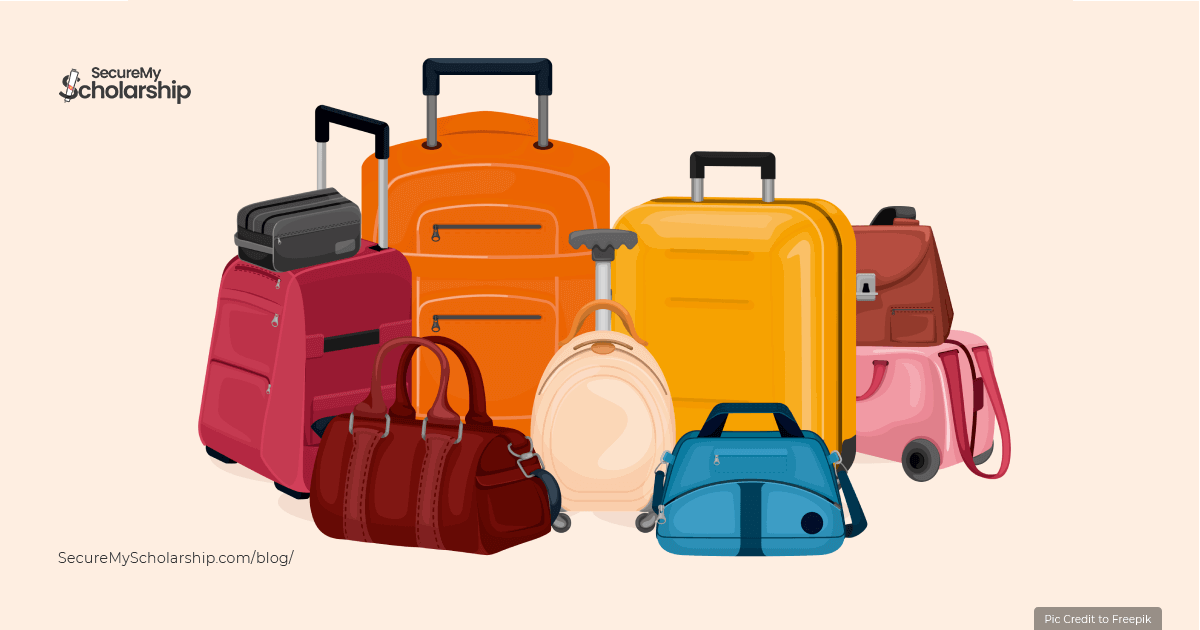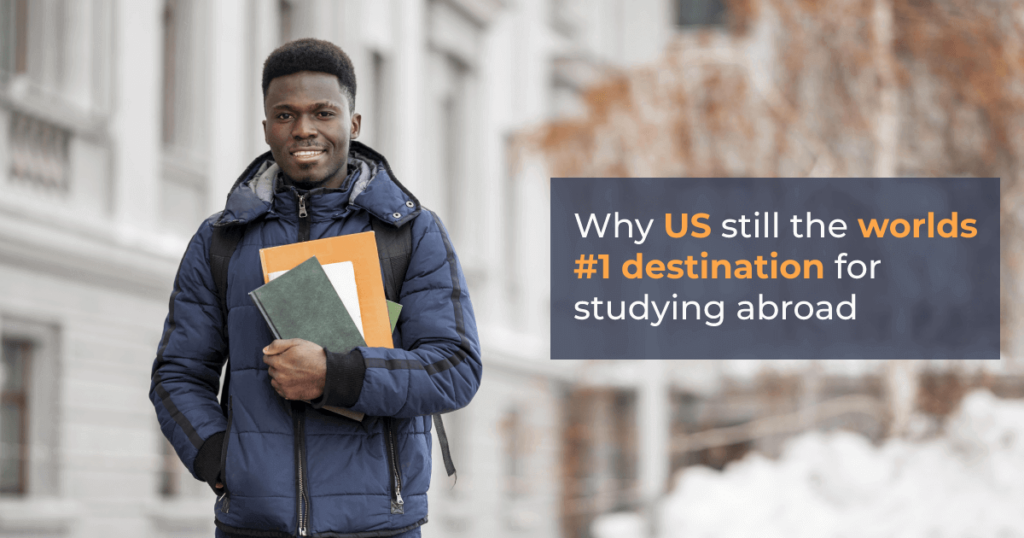Packing List for Studying Abroad in 2025 – It feels like we’re on wheels every morning when we hurry to school/office. We sometimes forget that we have a bag to put things into and carry a laptop, charger, water bottle, and all sorts of things in hand until we can’t move with them in hand any further!
On one such morning, I crash-landed in my cubicle at the office… I realized that I had left my mobile phone on my dining table. *Palm face*
I’m sure that happens to you, too… right?
Imagine you leave important things like this at home when you leave India to study abroad!
(I can see the world crashing down.)

Moving abroad is already high on energy consumption emotionally, but that also brings along a lot of tiring groundwork to be done, like choosing the right college, the admission process, the funding and scholarship process, and everything else.
So here is your packing list to grab all the necessary items before you leave, and don’t regret missing out on anything.
There are two major decisions you’ll have to make before packing for your travel,
- The right kind of Baggage
- What to carry and what not to carry
The Right Kind of Baggage
- Try to carry a maximum of 2-3 pieces of Luggage – A laptop bag/ backpack with wheels, a cabin-size trolley for carry-on luggage, and a sizable four-wheeled trolley for check-in luggage.
- Try and organize the vital and lightweight items in the cabin luggage. There’s going to be a lot of walking carrying them!
- Place the larger and heavier things in the check-in luggage first, then stack the smaller items around and above the larger ones.
- Choose your luggage with safety locks and handy compartments for your phone, water bottle, boarding pass, etc.
What to pack while moving to study abroad?
While there’s a whole list of things that could fit in an entire plane, unfortunately, we can use only a part of the plane’s luggage storage!
So here’s a packing list of essential items for this travel
Documents
If a student decides to travel abroad for studies, they may have to start the process well in advance.
Why?
Well, because the process itself is very long, from sourcing documents from the previous university, the results of exams for studying abroad, application and admission letter, bank statements for loans, documents related to scholarship, if any, student visa, etc.,
While there are many documents that each country and the university might ask for, a few standard documents are mandatory for the process across countries.
Here are a few documents that students need to carry when they are moving abroad in the USA, UK or Canada for their studies
- ID proof like passport, other ID proofs that are valid in your home country, and the ones valid internationally
- The student visa
- The transcripts and certificates from your previous university or workplace, like degree certificates, relieving letters, Mark statements, etc
- The results of study-abroad exams that you have attempted as prescribed by your university
- The offer letter or the admission letter provided by the university that you’re about to join
- Letter of recommendation from your previous university or workplace
- Any document related to your funding for your tuition fees or your expenses abroad, like loan sanction letter, scholarship schedule
- A copy of your travel and medical insurance
- A copy of the medical prescription, if any
Carry the original copies of all the applicable documents. Also, have photocopies along.
However, it is better to have a scanned copy of all these documents stored in your cloud drive so you can access it anytime.
You can apply for study abroad Scholarships right after receiving the offer letter. However, some scholarships require you to apply only after reaching college since they are offered based on the merits you score in your chosen course.
Psst. Secure My Scholarship offers unique scholarships for Indian students who want to study abroad.
Don’t miss out on them!
Finances
Planning your finances is crucial while travelling, especially when moving to a different country for an extended period.
Yes, you might be planning for a part-time job, but Similar to how squirrels collect nuts during autumn to survive during winter, it is imperative to have extra cash in hand with you.
Here is a list of things related to your finances that you need to carry while moving abroad
- Liquid cash in the currency of the foreign land
- Split the cash you have so that you have some money handy for food/transport at home and in the foreign country, and the remaining cash is tucked in safely.
- Debit and credit card that allows international transactions
Essentials
This part of the list is the longest, and there are high chances of you missing out on any of these items, so watch out!
Clothes
You can choose what clothes to carry throughout the year based on the foreign country’s climatic conditions.
- Casual wear
- Formalwear
- Pyjamas
- Winter wear and raincoat if needed
- One piece of your traditional wear ( you know… just in case)
- Shoes and socks
- Comfortable sandals
- Flip-flops
Toiletries
- Soap and shampoo
- Toothbrush
- Moisturizers
- Sanitary items
- Hairbrush/ comb
- Any other cosmetics that you use
Carry these toiletries in leakproof packages and in smaller quantities.
Medication
- Have the prescription handy if any
- Required amount of prescribed medicines
- Pain Balms, sprays and other ointments
- Inhalers, support belts, and other equipment if need be
Gadgets
- Mobile phones
- Laptops
- Power bank & charges
- Cables
- Camera
- Pen drives/hard disk
- Adapters and socket converters
Additions Guides for your packing list for studying abroad
1. Starting to pack a few weeks before your flight is a great way to give yourself plenty of time to figure out what you really need and what you can stay behind.
This way, you can also make sure your luggage meets the airline’s weight limits without any last-minute stress. One essential item is a sturdy padlock, which keeps your room secure while you’re out exploring. Opt for combination locks to avoid the hassle of losing keys.
2. While snapping photos with your camera is fantastic, there’s something special about keeping a journal. Always have a small one handy to jot down your experiences. Journaling is known to enhance mindfulness and reduce stress, making it perfect for those times when you’re feeling a bit out of your comfort zone.
3. A reusable water bottle is a must, especially if you’re heading to a humid country. It keeps you hydrated and saves you from constantly buying bottled water. When it comes to clothing, wrinkle-free options are a lifesaver. Many brands offer stylish choices for both men and women that don’t require ironing.
4. Books, crossword puzzles, and other non-electronic activities should definitely be on your packing list. Cutting down on screen time helps you fully immerse yourself in your new environment.
5. Leave luxury items like expensive jewellery and watches at home—they can attract unwanted attention. It’s also wise to skip packing your favourite snacks. Not only do they take up valuable space, but many countries have strict food import rules. Instead, embrace the chance to try local delicacies.
6. Use compression bags for bulky items like jeans and jackets. This little trick will save space in your suitcase, giving you more room for the essentials you’ll need for your study abroad adventure.
Also, check these blogs –
- Packing List for International Students to the USA
- Packing List for International Students to the UK
- Packing List for International Students to Canada
What not to carry?
There are times when we don’t really use a few products, but we can’t let go of them either, so don’t make travelling abroad one such time.
You don’t have to carry each piece you own. Carry only what is necessary for the initial days of your stay in the new home-away-from-home. You can always restock as and when needed.
Well, you know why. Luggage beyond the permitted weight will cost you nothing less than gold!
- Sharp objects or weapons like knives and scissors
- A pen to fill out the forms is fine, but a range of Faber-Castell products is not.
- Unsealed food packages. We all know you’ll miss your homemade food, but NO.
There are specified items that are prohibited in different countries,
Let’s say Japan has banned chewing gum; hence, it is prohibited to carry it if you are moving to Japan.
There are a few restrictions in carrying the permitted things as well. A few items, like electronic gadgets, should not be taken in check-in luggage but in cabin luggage and some items, vice versa.
Research them before you decide on the packing list for studying abroad.
Moving abroad for studies, taking study-abroad exams, getting admitted into your dream college, and sourcing funds or a scholarship seems daunting. Still, with the proper knowledge and timely completion of each process, all of those will be easier.
We at SecureMyScholarship have your back and are helping you reach your dream college with ease. Planning to study abroad on scholarships? Reach out to us now!
FAQs Related to Packing List for Studying Abroad
Q1. What do study abroad students really need?
You’ll need the essentials:
- Documents: Your passport, visa, and admission letter are non-negotiable! Don’t forget ID proofs and health insurance.
- Clothing: Pack for the weather. Layers work wonders if you’re unsure.
- Electronics: A laptop, chargers, and universal adapters are must-haves.
- Extras: Toiletries, basic meds, and a notebook for all those new experiences.
Q2. What shouldn’t I bring for study abroad?
Skip the unnecessary stuff:
- Bulky items: Like bedding or kitchenware – you can buy them there.
- Prohibited items: No sharp objects or food customs won’t allow.
- Excessive clothing: You’ll end up wearing the same 5 outfits anyway.
- Valuables: Don’t risk losing sentimental items.
Q3. How many bags should I bring?
Keep it simple:
- One large suitcase for all your essentials.
- One carry-on for your electronics and documents.
- A backpack for daily use (and it’s perfect for weekend trips too!).
Pro tip: Check your airline’s baggage allowance to avoid surprises.
Q4. When should I start packing?
Don’t wait till the night before! Start 2-3 weeks before your flight.
This way, you have time to:
- Make a packing list for studying abroad.
- Shop for missing items.
- Pack calmly and smartly.
Q5. How much money do I need to study abroad?
It depends on the country and your lifestyle, but here’s a rough guide:
- Budget-friendly options: ₹7-10 lakhs per year.
- Premium destinations: ₹20-30 lakhs per year.
Always keep some extra for emergencies.
Q6. How do I pack my luggage as an international student?
Packing like a pro:
- Follow a packing list for studying abroad to stay organized.
- Roll your clothes to save space (and avoid wrinkles).
- Use compression bags for bulkier items.
- Keep important stuff like documents, medicines, and valuables in your carry-on.
Q7. How many shoes should I pack?
Stick to the basics:
- 1 pair of formal shoes.
- 1 pair of sneakers or casual shoes.
- 1 pair of boots or weather-appropriate shoes.
- Flip-flops or sandals for lounging.
No need to pack your entire shoe rack!
Q8. Can I pack food for international travel?
Yes, but be smart about it:
- Pack non-perishable items like instant noodles, spices, or snacks.
- Use zip-lock bags to prevent leaks.
- Check customs regulations – you don’t want your mom’s pickles confiscated!
Q9. What marks do I need to go abroad?
Most programs require:
- Undergraduate: At least 50-60% in high school.
- Postgraduate: 60% or higher in your bachelor’s.
And yes, you’ll likely need to pass English proficiency tests like IELTS or TOEFL.
Q10. What percentage is needed to study abroad?
While it varies, aim for:
- 50-70% for undergrad.
- 60-75% for postgrad.
Better grades also boost your chances for scholarships.
Q11. What are the best subjects to study abroad?
It depends on your interests, but here are a few popular ones:
- STEM fields: Tech, engineering, or data science.
- Business: MBA, finance, or marketing.
- Creative Arts: Film, design, or music.
- Health Sciences: Public health or medicine.
Q12. Which intake is best for studying abroad?
It depends on your plans:
- Fall (Sept/Oct): Most popular, with more programs and scholarships.
- Spring (Jan/Feb): Fewer options but good if you missed the fall intake.
- Summer (May/June): Best for short-term programs or specialized courses.
Q13. What do students actually do when they study abroad?
A bit of everything:
- Classes: Yep, you’ll need to study!
- Exploring: Dive into local culture and make the most of your weekends.
- Networking: Meet people from all over the world.
- Traveling: Tick off those bucket list destinations.
- Internships or volunteering: Gain work experience and boost your CV.




